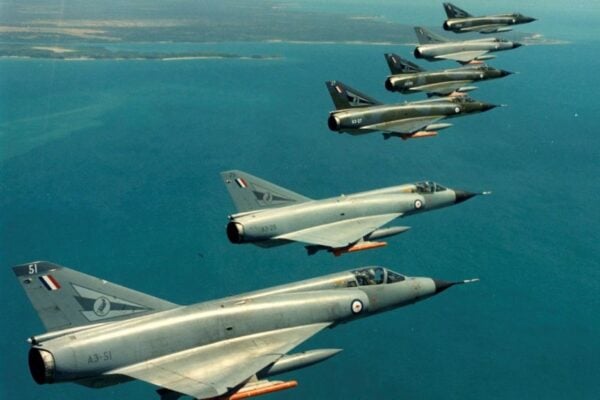
Australian Dassault Mirage IIIs, the result of one of the first major defence projects between Australia and France.
The United States and France have always had a symbiotic relationship, as much as people today would not acknowledge it or recognise it. The French Navy supported the Americans in their revolution against the British in the founding of the United States, and continued to be a model of progressive government in the formation of the American Republic and Presidential system of Government. These two nations formed much of the modern systems of democracy and fought shoulder to shoulder during the First World War paying homage to Lafayette and their shared past. Americans fought to re-entrench French democracy during the Second World War and while France set themselves apart from NATO in the following decades, France, the US and NATO allies worked together to promote democratic values worldwide.
The recent spat that lead to France recalling their ambassador to the United States requires a great deal of context to explain fractures between France and the US. French industry, namely its aircraft industry, was decimated during the Second World War, so much so that the post war period was defined by re-establishing France’s technological prowess and national pride along with competing internationally. France’s largest aircraft manufacturer at the time, Dassault(named after its founder’s Partisan code name during the war), first gained its international reputation by beating out the UK and US competitors selling Mirage III fighter jets to Australia. Australia’s connection with the French defence industry allowed France to expand that sector greatly over the years, and likely lead a culture and relationship that created the submarine deal set a few years back, promising to injecting $66 billion into France’s economy.
The US and France however were always in intense competition in heavy industries. The success of Dassault and relationships with other European countries lead to the creation of Airbus, an airline manufacturer that has been in heavy competition with Boeing over the last 30 years. The intensity of competition between those two mega-corporations dragged in their respective governments over the years, along with thousands of lawyers and dozens of legal conflicts regarding competition, unfair trade practices and contract disputes.
A fracture in policy was also in play since the 1960s when France decided to leave NATO, produce its own defense industry and challenge US hegemony on the world stage. The 1956 Suez Canal crisis put the UK and France at odd with the US in the post-colonial era, and the following years lead France to focus on policy challenging what was seen as American colonial expansion. Since the Syrian War post-2015, France was also pushing for a more assertive stance against the Assad regime, while the US often was more passive and confused in their approach. The recent high pressure evacuation from Afghanistan, where hundreds of French soldiers lost their lives, also created fissures between the US and its allies, soon to be met with the new submarine deal and AUKUS defense pack with Australia, the UK and US a few short weeks later.
France has been a strong defence ally of the United States, UK and Australia, and with the loss of the $66 billion submarine deal to dump conventionally fuelled French submarines for nuclear powered American submarines, French employment in that industry will be harmed greatly. The bitterness of the Boeing-Airbus disputes over contracts and jobs may be shadowing this move by the Biden Administration. While bad faith disputes between governments regarding Airbus and Boeing were more common, Australia is also likely reacting to foul relations it has had with China directly and hopes to become a more active participant in limiting the power of China’s ever expanding navy. While China has had a strong response to arming Australia with nuclear powered submarines, those submarines will not carry nuclear weapons and is a logical response to China’s Navy, that has doubled in size and have produced Aircraft carriers since 2015. Under the spirit of Lafayette, the US and France should come to terms over their dispute regarding Australia and its new defence pact and integrate France economically and strategically into the fold in the region. France has been the strongest US ally against international terrorism and had dedicated the lives of its soldiers more than any other nation in the world along with the United States. The new AUKUS may displace much of the focus on the Five Eyes relationship, and while France is not a part of it, they also are not acting like one of the Five Eyes that have been shut. France have not been making questionable security decisions lately like Canada has done over the last few years. France and the United States are democratic cousins in the best possible manner, and this tradition should be honoured.